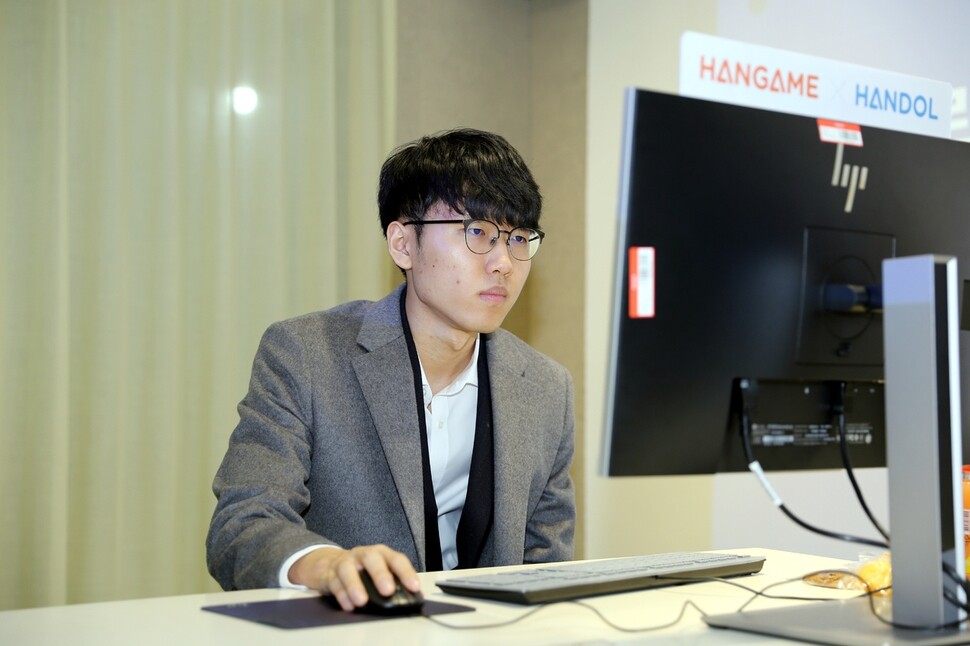hankyoreh
Links to other country sites 다른 나라 사이트 링크
S. Korea Go program beats country’s top five professional players

After defeating 9-dan Go grandmaster Lee Se-dol in the “match of the century” in 2016 and going on to defeat Ke Jie, another 9-dan grandmaster, the following year, Google’s AlphaGo computer program retired from the game. AlphaGo Zero, the preeminent Go-playing software based on artificial intelligence (AI), was developed in Oct. 2017, but it hasn’t played any matches against humans.
Since AlphaGo was released, Go-playing computer programs, which represent a synthesis of artificial intelligence (AI) and deep learning, have been developed in several other countries, including China and Japan. Currently, Fine Art (Jue Yi in Chinese), created by Chinese game company Tencent, is regarded as being especially strong.
South Korea also has a Go-playing software program that can challenge AlphaGo. The software is called HanDol, provided by NHN Entertainment’s Hangame online Go service.
On Jan. 23, a match was held at the office of NHN Entertainment in Pangyo, Gyeonggi Province, between HanDol and 9-dan Shin Jin-seo, who was the top-ranked professional Go player in South Korea until last month. Playing as white, HanDol, won an overwhelming victory after 190 moves. The match lasted about 1 hour and 30 minutes.
Prior to this, HanDol had played the next four players in the rankings (as of last month), picking off 9-dan Shin Min-jun, 9-dan Lee Dong-hun, 9-dan Kim Ji-seok and 9-dan Park Jeong-hwan one after another. With the victory over Shin Jin-seo, HanDol completed its sweep against the top five professional Go players in the country.
“I felt a lot of pressure since this was the final match. Though there’s an element of frustration [in playing against an AI system], it was an opportunity to learn a little more,” Shin Jin-seo said following the match.
“I’d say HanDol is similar to or a little worse than AlphaGo Master, the program that beat Ke Jie.”
Development on HanDol began in 2016, amid the AlphaGo craze, and version 1.0 was released in Dec. 2017, with a playing ability comparable to a 9-dan human pro player. While HanDol 1.0 predicted the next move based on records of human Go games and human-designed patterns, version 2.0 was an upgraded version that developed its ability by playing games against itself, without needing to refer to human records. NHN Entertainment regards the current HanDol, version 2.1, as having surpassed the ability of AlphaGo Lee, the version that defeated 9-dan Lee Se-dol.
NHN Entertainment is also using HanDol in its Go game service. Some applications include the “HanDol lifeline,” which offers hints about the next move, and the “HanDol victory rating graph,” which replays completed games and helps players analyze the course of the game by pointing out moves that were particularly helpful or harmful. The company said it also plans to develop content for beginners and to enhance the gaming experience by enabling HanDol to mimic the playing style of famous players such as Lee Chang-ho or Lee Se-dol.
“We developed HanDol to aid our basic understanding and utilization of AI technology. We intend to use AI technology to benefit many users not only in games but in a variety of areas,” said Park Geun-han, head of technological research at NHN Entertainment.
By Park Tae-woo, staff reporter
Please direct comments or questions to [english@hani.co.kr]

Editorial・opinion
![[Column] Has Korea, too, crossed the Rubicon on China? [Column] Has Korea, too, crossed the Rubicon on China?](https://flexible.img.hani.co.kr/flexible/normal/500/300/imgdb/original/2024/0419/9317135153409185.jpg) [Column] Has Korea, too, crossed the Rubicon on China?
[Column] Has Korea, too, crossed the Rubicon on China?![[Correspondent’s column] In Japan’s alliance with US, echoes of its past alliances with UK [Correspondent’s column] In Japan’s alliance with US, echoes of its past alliances with UK](https://flexible.img.hani.co.kr/flexible/normal/500/300/imgdb/original/2024/0419/2317135166563519.jpg) [Correspondent’s column] In Japan’s alliance with US, echoes of its past alliances with UK
[Correspondent’s column] In Japan’s alliance with US, echoes of its past alliances with UK- [Editorial] Does Yoon think the Korean public is wrong?
- [Editorial] As it bolsters its alliance with US, Japan must be accountable for past
- [Guest essay] Amending the Constitution is Yoon’s key to leaving office in public’s good graces
- [Editorial] 10 years on, lessons of Sewol tragedy must never be forgotten
- [Column] A death blow to Korea’s prosecutor politics
- [Correspondent’s column] The US and the end of Japanese pacifism
- [Guest essay] How Korea turned its trainee doctors into monsters
- [Guest essay] As someone who helped forge Seoul-Moscow ties, their status today troubles me
Most viewed articles
- 1[Column] The clock is ticking for Korea’s first lady
- 2[Correspondent’s column] In Japan’s alliance with US, echoes of its past alliances with UK
- 3Samsung barricades office as unionized workers strike for better conditions
- 4After 2 months of delayed, denied medical care, Koreans worry worst may be yet to come
- 5[Column] Has Korea, too, crossed the Rubicon on China?
- 6[Editorial] When the choice is kids or career, Korea will never overcome birth rate woes
- 7Hong Se-hwa, voice for tolerance whose memoir of exile touched a chord, dies at 76
- 8US overtakes China as Korea’s top export market, prompting trade sanction jitters
- 9Constitutional Court rules to disband left-wing Unified Progressive Party
- 10Nearly 1 in 5 N. Korean defectors say they regret coming to S. Korea